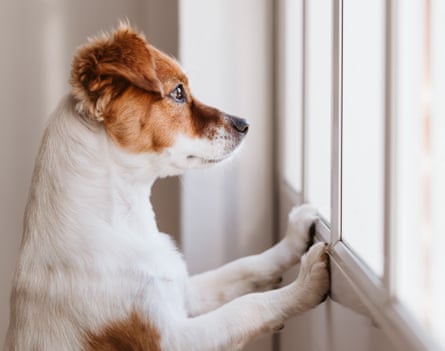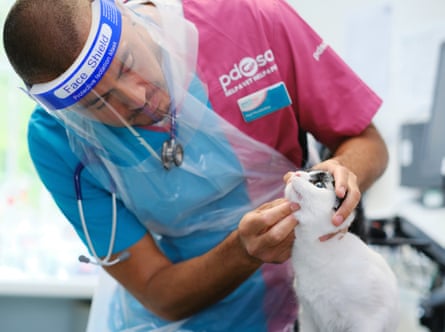Owning a pet can be an expensive business. From food to vet care, there are a range of obligatory outgoings, and with the soaring cost of living, many owners are worried about meeting the costs of looking after their pets.
According to a survey of 4,000 people carried out for the RSPCA, 78% of pet owners think the cost of living crisis will have a negative impact on their animals, while 68% said they were concerned that care costs were already increasing, and 19% said they were worried about how they would afford to feed their pets.
Consider the costs in advance
If you are considering getting a pet, it is vital to work out the financial implications first. “Before taking on any pet, we strongly advise prospective owners to do thorough research into how they can provide for their needs, including looking into the costs involved,” Lynne James, a vet from the charity PDSA, says.
“Costs including food, preventive healthcare, accessories and insurance can quickly add up. That’s without the expense of unexpected vet bills should your pet become unwell or be involved in an accident.”
Of course, the costs will vary wildly according to the type of animal and breed but James says: “A large-breed dog, for example, can cost £30,000 over their lifetime, and cat owners could be spending as much as £24,000. These costs can be significantly more, depending on many factors including health, training and grooming needs.”
Find cheaper food
The RSPCA suggests finding a cheaper pet food that will still meet your pet’s needs, or perhaps mixing a cheaper food with the usual product you buy to make it last longer.
While for dogs and cats, big bags of dry food are typically more expensive upfront than wet food, the overall cost is lower. The most important thing, the charity advises, is that you should feed your animal a well-balanced diet that suits their species, age and any specific health problems – but check with your vet before making big changes to your pet’s diet.
 View image in fullscreenYou could mix your usual brand of pet food with a cheaper product. Photograph: Sally Anscombe/Getty Images
View image in fullscreenYou could mix your usual brand of pet food with a cheaper product. Photograph: Sally Anscombe/Getty Images
Daycare for dogs
Some animals can cope better than others when you go out to work. While cats can usually be left to their own devices, dogs need more attention. “We would ideally suggest that dogs should only be left alone for half a working day, so it’s a good idea to get someone to pop in and let them out or take them for a walk at some point during the day,” Rebecca Verne, the rehoming and welfare manager at Battersea Dogs & Cats Home, says. “If not, all of that time alone is quite a long period for them to be left, and, unfortunately, you could start to create separation anxiety issues.”
 View image in fullscreenSome pets cope better than others when their owners go out to work. Photograph: Eva Blanco/Getty Images/iStockphoto
View image in fullscreenSome pets cope better than others when their owners go out to work. Photograph: Eva Blanco/Getty Images/iStockphoto
Doggy daycare can be costly: last year, Admiral pet insurance put the average cost at £3,456 a year.
The RSPCA suggests cutting out expensive pet-sitting services in favour of asking friends and family to help, or setting up a local community group to help neighbours with pet care – but urges owners to remember to introduce their pets to new people gradually and ensure everyone is comfortable before leaving them in charge.
If neighbours are not an option, the online service BorrowMyDoggy offers another possibility. The service puts dog owners in touch with local dog lovers who will look after (well, borrow) their dog. No money changes hands between owners and borrowers – it is all done for the love of dogs – but BorrowMyDoggy charges an annual fee of £44.99 for owners, which covers messaging services, insurance and a 24-hour vet hotline. (It is £12.99 for borrowers to sign up and offer their services.)
Invest in pet insurance
Unexpected vet bills can be a source of stress and wreak havoc on household finances. A checkup with a vet will often cost between £40 and £60 but treatment for injuries or illnesses can run to hundreds or even thousands of pounds. “We would highly recommend insurance,” Verne says. “It’s not easy to have that kind of money set aside for potential vet bills. Use cost comparison websites and get advice about what companies cover, the kind of medical costs that will be included and so on.”
According to MoneySuperMarket.com, average premiums for a dog cost £24.94 a month for a 12-month policy, and cat cover costs £17.54 a month. (The figures cover all breeds and ages and all types of policies, and don’t include those that provide cover for pre-existing conditions.)
There are four main kinds of cover available
There are four main kinds of cover available. Lifetime policies will cover most vet bills related to injury or illness up to an annual limit, which is reset at the end of the year. Accident-only policies, as the name suggests, will only cover vet bills related to treating injuries resulting from an accident. Maximum benefit policies cover most vet bills related to injury or illness – within an agreed-upon limit for each illness or condition. Once the limit is reached, vet bills to treat that condition will no longer be covered. Finally, time-limited policies cover most vet bills for injuries and illnesses but there are limits to the amount that can be claimed for each condition, as well as for how long you can claim for each condition. When that time (usually 12 months) is up, or once you have reached the limit amount, you will no longer be able to claim.
 View image in fullscreenMoneySuperMarket.com says average cat cover costs £17.54 a month. Photograph: Anadolu Agency/Getty Images
View image in fullscreenMoneySuperMarket.com says average cat cover costs £17.54 a month. Photograph: Anadolu Agency/Getty Images
“Pet insurance isn’t one size fits all, and the cost depends on things like breed, age and previous conditions, so it’s important to compare policies to find the right cover at the best price,” Dave Merrick, a pet insurance expert at MoneySuperMarket, says.
“When you’re comparing policies, check the extra benefits that are included, for instance, free video vet consultations, dental cover or pet travel insurance, to see what could add the most value for your pet.”
He adds, always check the policy’s excess – in other words, the amount you will need to pay towards a vet bill when making a claim: “The higher the excess, the lower the cost of the policy, so it’s worth considering how much you could afford to pay.”
Ask your vet about payment plans
Some – although not all – vets offer a payment plan service that allows pet owners to spread the cost of treatment.
Often you pay a small-ish amount each week or month to cover necessary costs such as vaccinations, as well as other treatments.
Keep up with preventive care
“Preventive healthcare such as vaccinations and neutering can avoid future vet bills,” the PDSA’s James says. “While it does have an upfront cost, preventive care will save money in the long term and is vital for keeping pets fit and healthy. Monitoring your pet’s weight and contacting your vet if you have any concerns can also help to avoid costly bills resulting from weight-related health problems, such as arthritis and diabetes, which require lifelong medication. As well as being healthier for your pet, not overfeeding will also have a positive impact on your shopping bill.”
 View image in fullscreenThe PDSA has 48 pet hospitals in the UK. Photograph: PDSA/PA
View image in fullscreenThe PDSA has 48 pet hospitals in the UK. Photograph: PDSA/PA
Find out if you can get help with costs
“We understand that not every eventuality can be planned for, and anyone’s circumstances can change without warning,” James says. “The rising cost of fuel and household bills are putting pressure on homes across the UK. People who find themselves struggling to afford to pay for their pet’s veterinary care can seek support from PDSA.”
There are 48 PDSA pet hospitals in the UK, and the charity supported more than 370,000 pets and their owners in 2021, James says.
“We expect the demand for our services to rise as the financial squeeze tightens. We would encourage anyone struggling to cover the cost of veterinary treatments to find out if they are entitled to access our services.”
To check if you are eligible, visit the PDSA website.



